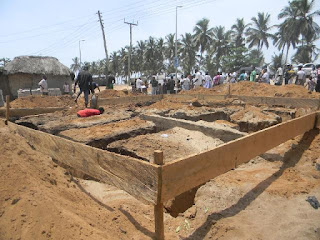By: Kwamina Bamfo-Agyei
 |
| Sod Cutting of the Toilet facility project at Duakor |
In Ghana, only 13% of the populace has access to improved toilets. This does not include those who share their toilets with their friends and neighbours or use public toilets.
In the toilet world ‘’Chop time no friend’’ is strictly applied to the letter and the best slogan is ‘one man one seat-one family one toilet’.
When it comes to the figures quoted above, one will always have to ask the multi-million cedi question “So where do the huge 87% of Ghanaians attend nature’s call?’’. Well the answer is not far fetched. They do it in the gutters, open spaces, behind houses and properties, on refuse dumps, at our beautiful beaches, river bodies and so on.
It is in light of this sanitation challenges confronting the residents of Duakor in the Cape Coast Metropolis that Global Host Project, an NGO, has cut the sod for the construction of a 10-seater toilet facility worth GH¢ 23,328.70. The public toilet facility is intended to improve sanitation at the area and along the beach since due to lack of toilet facility they resort to defecate at the beach.
 |
| Odua Kwesi Sampson (Country Director) |
The Country Director of Global Host Project, Odua Kwesi Sampson, disclosed plans were far advanced to build identical toilet facilities in Ahenborboi, Okyeso and Abakam.
Mr Sampson said his outfit would donate computers to basic schools that serve the communities of Duakor Ahenborboi, Okyese and Abakam, and was happy that the community has provided electricity to the school at Duakor. He said that St Monica’s Girls School in Cape Coast would also be provided with some computers.
He revealed that a volunteer would be arriving from the USA in June to install and repair computers at the Junior High Schools in the area and that.
The Global Host Project was founded in 2008 with the aim of promoting developmental projects by constructing useful social amenities to communities where they operate.
The Global Host Project was founded in 2008 with the aim of promoting developmental projects by constructing useful social amenities to communities where they operate.
Donation from philanthropists go towards charitable causes such as scholarships for the brilliant but needy students or feeding costs for children in orphanages, as well as building repairs for orphanages, schools and hospitals.
In addition, there is a strong need for the following items in Ghana. If any philanthropist has any of these items to donate, Global Host Project would be deeply grateful–and, can receive a tax deduction for it as well.
- Computers for schools
- School supplies (books, pens, pencils, paper, etc).
- Clothing, toys, footballs, used bicycles etc for children at orphanages.
- Medical supplies for outreach programs in rural communities such as condoms for STD prevention and birth control, wheel chairs for the disabled, etc.
He however appealed to other institution to donate to the project by visiting the website www. Globalhostproject.org or call 0542519233 or 0287996063.
 |
| Construction of the Toilet Facility |
The chief of the area, Togbe Ayivi II, commended both the assembly member and the Global Host Project for their efforts at providing the community with a toilet facility, saying that, the lack of such facilities had resulted in needless deaths.
He pledged to give the project the needed support to ensure it was completed on schedule, whilst he called on other NGOs to come to the aid of the community
He pledged to give the project the needed support to ensure it was completed on schedule, whilst he called on other NGOs to come to the aid of the community
The Director of Environmental Health and Sanitation, Demedeme Naa Lenason was quoted to have said “the 2000 census revealed that 31.45 per cent households in Ghana used public latrines as compared to 8.5 per cent using water closet; 22 per cent used pit latrine, 6.9 per cent used KVIP, four per cent used bucket or pan latrine and 6.9 per cent attend to nature's call in other people's houses”.
Across Africa, about 62 per cent of the people do not have access to an improved toilet, the WHO/UNICEF Joint Monitoring Programme for Water Supply and Sanitation reported.
Though having a clean accessible toilet is also central to the human rights and personal dignity of every woman, man and child, 2.6 billion people - half the developing world - lack a simple "improved" latrine.
Though having a clean accessible toilet is also central to the human rights and personal dignity of every woman, man and child, 2.6 billion people - half the developing world - lack a simple "improved" latrine.
The WHO and UNICEF estimate that 1.2 billion people worldwide gained access to improved sanitation between 1990 and 2004, while about 980 million children had no toilets facilities.
If current trends continue, there will still be 2.4 billion people without basic sanitation in 2015, which is the target year for halving the number of people without access to sanitation and safe drinking water. The main problem will be that the children among them will continue to pay the price in lost lives, missed schooling, in disease, malnutrition and poverty.
If current trends continue, there will still be 2.4 billion people without basic sanitation in 2015, which is the target year for halving the number of people without access to sanitation and safe drinking water. The main problem will be that the children among them will continue to pay the price in lost lives, missed schooling, in disease, malnutrition and poverty.
As for Sub-Saharan Africa, it has been predicted that not until 2076 can the MDG goals be met, which is, about 61 years later than the target. Therefore, this means a child somewhere today may have to wait for at least 68 years before being able to use a proper toilet.
